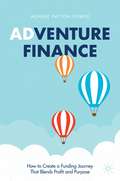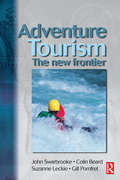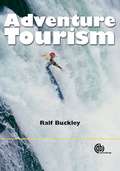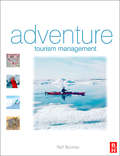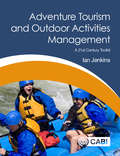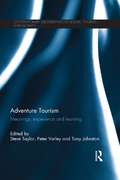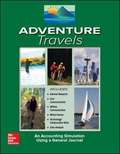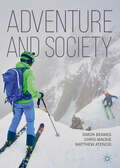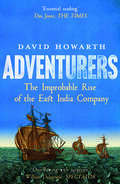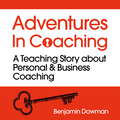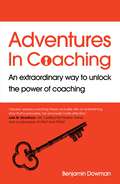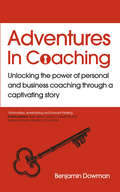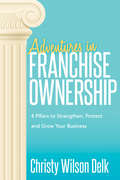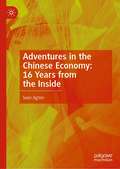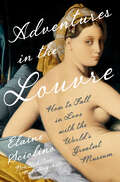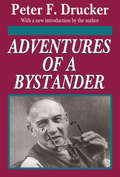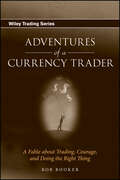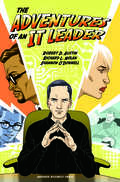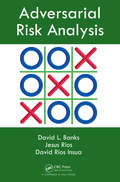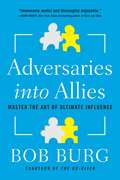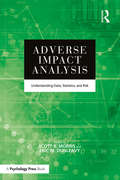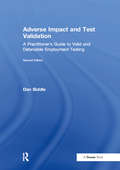- Table View
- List View
Adventure Finance: How to Create a Funding Journey That Blends Profit and Purpose
by Aunnie Patton PowerThe venture capital model doesn’t work—at least not for 99% of startups and small businesses. In this 99% are a lot of companies with incredible potential: businesses headed by female founders and those from diverse racial backgrounds, organizations headquartered outside of venture capital hubs, and purpose-driven enterprises that are creating social and environmental impact alongside financial success. Counter to what the press-savvy venture capital world would have you believe, there are a lot of funding options out there for startups and small businesses. Adventure Finance is designed to help you understand some of these options, and walk you through real examples of how other founders and funders have put them to use. In simple, approachable language, the book breaks down the different types of funding options available from revenue-based financing to recoverable grants to redeemable equity to distributed ownership and more. Through a mix of storytelling and frameworks, based on a decade of research and experience in investing in early-stage companies, this book will give you the ability to determine how each of these structures can contribute to your own funding journey. The goal for this book is to shift the conversation about startup funding and help founders and funders widen the spectrum of “mainstream” investment options in order to make the venture financing world more inclusive and purpose-driven.
Adventure Tourism
by Colin Beard John Swarbrooke Suzanne Leckie Gill PomfretLooking at the past, present and future of adventure tourism, Adventure Tourism: the new frontier examines the product, the adventure tourist profile, and issues such as supply, geography and sustainability. International case studies are used to illustrate these issues, including: Gorilla watching holidays,Trekking on Mount Everest, Diving holidays, and Outward Bound packages.Analysis of the development and nature of adventure tourism accompanies these studies, ensuring that the title is useful both for undergraduate and postgraduate students of tourism and for professionals involved in managing adventure tourism enterprises.There is also a companion website with additional cases, which can be found at www.bh/com/companions/0750651865.
Adventure Tourism
by Ralf BuckleyAdventure tourism is a new, rapidly growing area at both practical and academic levels. Written at an introductory level, Adventure Tourism provides a basic background and covers commercial adventure tourism products across a range of adventure tourism sectors.
Adventure Tourism Management
by Ralf BuckleyThe academic study of adventure tourism is rapidly increasing in popularity, with research beginning to focus on it heavily. This book is a cohesive and comprehensive look at this multi-million dollar industry sector from a variety of perspectives relevant to the teaching of tourism. Ideal for the undergraduate student taking adventure tourism as a single subject degree, or as part of their tourism management studies, this book documents, analyses and offers insight into the latest research in the area. Includes analysis of products, trends, climate change, risk management and environmental management and many others. The Subsectors section within the book offers an overview of the twenty or more definable sectors within the adventure tourism industry considering their origins and history, latest trends and demographic groups. The author then goes on to look in more detail at: Wildlife Tourism, Marine Tourism, Helitourism, and Boardsports.Each chapter will include seven pedagogical elements:* introduction - what the chapter does and doesn't cover * plain-language review of the chapter topic with minimal referencing - essentially like lecture notes * concluding paragraph to the review section explaining how it leads to the next chapter(s)* review of recent research, condensed into tables where possible * revision notes - a few pages of bullet points summarising the review and research * a sample set of assignment questions, three to six per chapter in some cases* readings on relevant topics, condensed from previous publications.
Adventure Tourism and Outdoor Activities Management: A 21st Century Toolkit
by Ian JenkinsAn essential resource for those wishing to understand the driving factors behind the operation of an adventure tourism company, this textbook offers guidance on how to deliver a profitable and sustainable product. The importance of changing markets, technology and corporate social responsibility, including environmental impacts and climate change, are discussed in the context of managing an adventure tourism firm. To remain profitable, companies must address these issues along with the important aspects of risk and safety. Key features include: - Case studies from successful professionals in the industry. - Consideration of the development of sustainable adventure tourism. - Guidance on managing products and customers. Compiled from the author's experience in delivering adventure tourism courses over the last 20 years, this long-awaited book is aimed at both students taking university courses on adventure tourism and outdoor recreation as well as professionals working within the industry.
Adventure Tourism and Outdoor Activities Management: A 21st Century Toolkit
by Ian JenkinsAn essential resource for those wishing to understand the driving factors behind the operation of an adventure tourism company, this textbook offers guidance on how to deliver a profitable and sustainable product. The importance of changing markets, technology and corporate social responsibility, including environmental impacts and climate change, are discussed in the context of managing an adventure tourism firm. To remain profitable, companies must address these issues along with the important aspects of risk and safety. Key features include: - Case studies from successful professionals in the industry. - Consideration of the development of sustainable adventure tourism. - Guidance on managing products and customers. Compiled from the author's experience in delivering adventure tourism courses over the last 20 years, this long-awaited book is aimed at both students taking university courses on adventure tourism and outdoor recreation as well as professionals working within the industry.
Adventure Tourism: Meanings, experience and learning (Contemporary Geographies of Leisure, Tourism and Mobility)
by Tony Johnston Steve Taylor Peter VarleyAdventure tourism is an increasingly widespread phenomenon, appealing to an expanding proportion of the population who seek new destinations and new experiences. This timely, edited volume offers new theoretical perspectives of this emerging subset of Tourism. it uses philosophical and cutting edge empirically grounded research to challenge existing thinking and develop the conceptual framework underpinning definitions of adventure, interrogating the adventure tourism experience and further building upon recent advances in adventure education. The book brings together adventure literature from range of disciplines and applies it to focused study of Adventure Tourism. By doing so it significantly furthers understanding and moves forward this development of this area of Tourism. This significant volume is written by leading academics in the area, and will be valuable reading for all those interested in Adventure Tourism.
Adventure Travels: An Accounting Simulation Using a General Journal
by Glencoe Mcgraw-HillSimulation of an accountant working at a travel agency.
Adventure and Society
by Simon Beames Chris Mackie Matthew AtencioThis book provides a broad overview of the ways in which ‘adventurous practices’ influence, and are influenced by, the world around them. The concept of adventure is one that is too often tackled within subject silos of philosophy, education, tourism, or leisure. While much of the analysis is strong, there is little cross-pollination between disciplines. Adventure & Society pulls together the threads of these discourses into one coherent treatment of the term ‘adventure’ and the role that it plays in human social life of the 21st century. It explores how these practices can be considered more deeply through theoretical discourses of capitalism, identity construction, technology and social media, risk-taking, personal development, equalities, and sustainability. As such, the book speaks to a broad audience of undergraduate and postgraduate students across diverse subject areas, and aims to be an accessible starting point for deeper inquiry.
Adventurers: The Improbable Rise of the East India Company: 1550-1650
by David HowarthThe unlikely beginnings of the East India Company—from Tudor origins and rivalry with the superior Dutch—to laying the groundwork for future British expansion The East India Company was the largest commercial enterprise in British history, yet its roots in Tudor England are often overlooked. The Tudor revolution in commerce led ambitious merchants to search for new forms of investment, not least in risky overseas enterprises—and for these “adventurers” the most profitable bet of all would be on the Company. Through a host of stories and fascinating details, David Howarth brings to life the Company’s way of doing business—from the leaky ships and petty seafarers of its embattled early days to later sweeping commercial success. While the Company’s efforts met with disappointment in Japan, they sowed the seeds of success in India, setting the outline for what would later become the Raj. Drawing on an abundance of sources, Howarth shows how competition from European powers was vital to success—and considers whether the Company was truly “English” at all, or rather part of a Europe-wide movement.
Adventures in Coaching: An extraordinary way to unlock the power of coaching
by Ben Dowman*Discover the power of coaching through an entertaining and lively story that will develop the skills and understanding of how to coach effectively.*In this groundbreaking new approach to learning how to coach, join Alice on an adventure as she learns the fundamental principles of personal and business coaching. Meet a host of fanciful characters who will help you understand how to listen, how to ask questions effectively and how to have a coaching conversation from start to finish.Adventures in Coaching introduces Coaching as an approach for managing people, improving performance and solving problems. Research shows that learning is often better retained when made fun and stimulating. This book delivers the most rigorous and advanced textbook coaching theory, including the GROW model, in a uniquely engaging and mesmerising manner. The structure and sequence of the material is based on a tried and tested progression that the author has refined through his training and workshops with hundreds of people.The book is brought to life through relevant coaching conversations and practical examples as Alice puts her learning into practice. "Why are you talking about me in the third person, Ben? I'm right here." "Alice! Hello. I'm just introducing the book." "Have you said that I'm the star of the story?" "Of course, Alice." "Ben, can I introduce Rita and Ronald?" "Er... well... I'm not sure we should start with talking animals, this is a serious book." "Of course we should. Rita is a turtle who is an expert coach and she taught Ronald and I how to coach. Oh, and Ronald is a fish!" "Thank you, Alice!" Coaching is brought to life when Alice is faced with some tough coaching conversations and she applies her new learning to the clients she works with. Both new and existing coaches, as well as managers and leaders, will improve their skills of listening, asking questions and exploring ideas. "Good job, Ben. I can't wait to tell the story."(P) 2020 Hodder & Stoughton Ltd
Adventures in Coaching: Unlocking the power of personal and business coaching through a captivating story
by Ben Dowman**Discover the power of coaching through an entertaining and lively story that will develop the skills and understanding of how to coach effectively.** In this groundbreaking new approach to learning how to coach, join Alice on an adventure as she learns the fundamental principles of personal and business coaching. Meet a host of fanciful characters who will help you understand how to listen, how to ask questions effectively and how to have a coaching conversation from start to finish.Adventures in Coaching introduces Coaching as an approach for managing people, improving performance and solving problems. Research shows that learning is often better retained when made fun and stimulating. This book delivers the most rigorous and advanced textbook coaching theory, including the GROW model, in a uniquely engaging and mesmerising manner. The structure and sequence of the material is based on a tried and tested progression that the author has refined through his training and workshops with hundreds of people.The book is brought to life through relevant coaching conversations and practical examples as Alice puts her learning into practice. "Why are you talking about me in the third person, Ben? I'm right here." "Alice! Hello. I'm just introducing the book." "Have you said that I'm the star of the story?" "Of course, Alice." "Ben, can I introduce Rita and Ronald?" "Er... well... I'm not sure we should start with talking animals, this is a serious book." "Of course we should. Rita is a turtle who is an expert coach and she taught Ronald and I how to coach. Oh, and Ronald is a fish!" "Thank you, Alice!" Coaching is brought to life when Alice is faced with some tough coaching conversations and she applies her new learning to the clients she works with. Both new and existing coaches, as well as managers and leaders, will improve their skills of listening, asking questions and exploring ideas. "Good job, Ben. I can't wait to tell the story."
Adventures in Coaching: Unlocking the power of personal and business coaching through a captivating story
by Ben DowmanThis enchanting story uses Lewis Carroll's Alice's Adventures in Wonderland to explain personal and business coaching in a magical and entertaining adventure. A host of fanciful characters show readers how to have an effective coaching conversation from start to finish, and to reach real world outcomes in a more transformative way.In this captivating story, Alice finds herself turning into a pizza, going straight to jail on the Monopoly board and embarking on a space flight. Along the way she meets a helpful turtle, a charismatic ladybird and a fox with some personal problems, among a cast of curious characters.Research shows that learning is often better retained when made fun and stimulating. This book delivers the most rigorous and advanced textbook coaching theory, including the GROW model, contracting and feedback, in a uniquely engaging and mesmerising manner. The structure and sequence of the material is based on a tried and tested progression that the author has refined through his training and workshops over many years.This groundbreaking approach to learning to coach will do for coaching what Who Moved My Cheese did for managing change.
Adventures in Franchise Ownership: 4 Pillars to Strengthen, Protect and Grow Your Business
by Christy Wilson DelkWritten in the style of a business &‘tell-all&’, Adventures in Franchise Ownership lays out what successful franchisees do that you won&’t find in most owner&’s manuals and includes franchisee Christy Wilson Delk&’s good, bad, and really tough days before her successful exit 15 years later. Franchisees, like most small business owners, experience times of extreme frustration, lapses in motivation, and often exit before reaching their potential and their goals. Based on Christy&’s real-life franchise ownership adventures, this guide explains how her 4 Pillar to Pillars Approach helps all franchise owners get to the top tier of their franchise system and includes advice from 16 top performers representing over a dozen market segments. With humor, candor, and relatability, Christy fills in the gaps of the franchise Owner&’s Manual by providing a constructive framework for finding professional satisfaction and attaining the financial success franchise owners everywhere want and deserve.
Adventures in the Chinese Economy: 16 Years from the Inside
by Sven AgtenThis book provides an insightful overview of the social-economical trends in modern China, their global influence, and the disrupting consequences for businesses and countries all over the world. It is a fresh look at the business conditions that Western firms face in China, poised to become the world's largest and most dynamic economy. Using a vast array facts and data, combined with personal stories and experiences, Mr. Agten provides an accessible and entertaining glimpse at Chinese megatrends, such as the development of the middle class, innovation and upskilling, digitalization of Chinese society, rising labor costs and more. This book is a must-read for entrepreneurs, executives and economists seeking to understand the Chinese market.
Adventures in the Louvre: How to Fall in Love with the World's Greatest Museum
by Elaine SciolinoA former New York Times Paris bureau chief explores the Louvre, offering an intimate journey of discovery and revelation. The Louvre is the most famous museum in the world, attracting millions of visitors every year with its masterpieces. In Adventures in the Louvre, Elaine Sciolino immerses herself in this magical space and helps us fall in love with what was once a forbidding fortress. Exploring galleries, basements, rooftops, and gardens, Sciolino demystifies the Louvre, introducing us to her favorite artworks, both legendary and overlooked, and to the people who are the museum’s lifeblood: the curators, the artisans producing frames and engravings, the builders overseeing restorations, the firefighters protecting the aging structure. Blending investigative journalism, travelogue, history, and memoir, Sciolino walks her readers through the museum’s front gates and immerses them in its irresistible, engrossing world of beauty and culture. Adventures in the Louvre reveals the secrets of this grand monument of Paris and basks in its timeless, seductive power.
Adventures of a Bystander
by Peter DruckerPeter Drucker's lively and thoughtful memoirs are now available in paperback with a new introduction by the author. He writes with wit and spirit about people he has encountered in a long and varied life, including Sigmund Freud, Henry Luce, Alfred Sloan, John L. Lewis, and Marshall McLuhan. After beginning with his childhood in Vienna during and after World War I, Drucker moves on to Europe in the 1920s and early 1930s, describing the imminent doom posed by Hitler and the Nazis. He then goes on to describe London during the 1930s, America during the New Deal era, the World War II years, and beyond.According to John Brooks of The New York Times Book Review, "Peter Drucker is at a corner cafe, delightfully regaling anyone who will listen with tales of what must be one of the more varied—and for a practitioner of such a narrow skill as that of management counseling, astonishing—of contemporary professional lives." Dorothy Rabinowitz of the Washington Post writes, "The famous are here as well as the infamous.... All are the beneficiaries, for better or for worse, of Drucker's unerring eye for psychological detail, his remorseless curiosity, and his imaginative sympathy.... Drucker's book appears in a stroke to have restored the art of the memoir and of the essay."Adventures of a Bystander reflects Drucker's vitality, infinite curiosity, and interest in people, ideas, and the forces behind them. His book is a personal and informal account of the rich life of an independent man of letters, a life that spans eight decades and two continents. It will be of interest to scholars and professionals in the business world, historians, sociologists, and admirers of Peter Drucker.
Adventures of a Currency Trader
by Rob BookerPraise for ADVENTURES of a CURRENCY TRADER "A truly easy, unique, and enjoyable read! Rob has done it once again to teach us in the funniest way possible how not to make the most common trading mistakes. If you are tired of reading how-to books, this is perfect for you. I highly recommend this book to all traders. Everyone will learn something about themselves by reading this book. " -Kathy Lien, author, Day Trading the Currency Market, and Chief Strategist, www. dailyfx. com "Adventures of a Currency Trader is a must read for anyone who has ever traded or is thinking about trading in the Forex markets. Rob Booker has a unique way of taking years of market knowledge and transforming it into an educational and entertaining experience. It has quickly become a cult classic in my trading library!" -H. Jack Bouroudjian, Principal, Brewer Investment Group "Brilliant! Rob's humor and humanity shine through in this parable about trading and life. Filled with wisdom and wit, it's an exhilarating rollercoaster ride through the peaks and valleys of the learning curve, with many valuable lessons learned along the way. " -Ed Ponsi, President, FXEducator. com "Rob's fable of everyman 'Harry Banes' is destined to become a trading classic. This is both the missing piece and the foundation that comes before the strategies and methodologies. The search for the Holy Grail begins and ends in the heart and mind. The journey is authentic and real and if you're willing to take it with Rob, you will be rewarded in the end. Seldom has psychology and wisdom been so entertaining!" -Raghee Horner, trader and author of Forex Trading for Maximum Profit and Days of Forex Trading "In a series of insightful and entertaining vignettes, Rob Booker teaches both the novice and the experienced trader some hard won truths about the currency market. It's a must read book written by a guy who survived the trenches and went on to prosper in the biggest and most competitive financial market in the world. " -Boris Schlossberg, Senior Currency Strategist, Forex Capital Markets LLC, and author of Technical Analysis of the Currency Market
Adventures of an It Leader
by Robert D. Austin Richard L. Nolan Shannon O'DonnellBecoming an effective IT manager presents a host of challenges--from anticipating emerging technology to managing relationships with vendors, employees, and other managers. A good IT manager must also be a strong business leader.This book invites you to accompany new CIO Jim Barton to better understand the role of IT in your organization. You'll see Jim struggle through a challenging first year, handling (and fumbling) situations that, although fictional, are based on true events.You can read this book from beginning to end, or treat is as a series of cases. You can also skip around to address your most pressing needs. For example, need to learn about crisis management and security? Read chapters 10-12. You can formulate your own responses to a CIO's obstacles by reading the authors' regular "Reflection" questions.You'll turn to this book many times as you face IT-related issues in your own career.
Adversarial Reasoning: Computational Approaches to Reading the Opponent's Mind (Chapman & Hall/CRC Computer and Information Science Series)
by Alexander Kott William M. McEneaneyThe rising tide of threats, from financial cybercrime to asymmetric military conflicts, demands greater sophistication in tools and techniques of law enforcement, commercial and domestic security professionals, and terrorism prevention. Concentrating on computational solutions to determine or anticipate an adversary's intent, Adversarial Reasoning:
Adversarial Risk Analysis
by David L. Banks Jesus M. Aliaga David Rios InsuaWinner of the 2017 De Groot Prize awarded by the International Society for Bayesian Analysis (ISBA)A relatively new area of research, adversarial risk analysis (ARA) informs decision making when there are intelligent opponents and uncertain outcomes. Adversarial Risk Analysis develops methods for allocating defensive or offensive resources against
Adversaries into Allies
by Bob BurgThe Sages asked, "Who is mighty?" and answered, "Those who can control their own emotions and make of an enemy a friend. " In the bestselling book The Go-Giver, Bob Burg and John David Mann revolutionized the way we think about success via one very simple lesson: "Shifting one's focus from getting to giving (constantly and consistently providing value to others) is both very fulfilling and the most profitable way to do business. Now Burg is back with a new book, offering deeper insight into what it means to be truly influential and providing powerful strategies for mastering the art of winning people over. Faced with the task of persuading someone to do what we want, most of us expect, and often encounter, resistance. We see the other person as an adversary and often resort to coercion or manipulation in order to get our way. But while this approach might at times bring us short-term results, it leaves people with a bad feeling about themselves and about us. At that point, our relationship with the person is weakened and our influence dramatically decreased. There is a better way. Drawing on his own experiences and the stories of other influential people, Burg offers five simple principles of what he calls Ultimate Influence-the ability to win people to your side in a way that leaves everyone feeling great about the outcome . . . and about themselves!: Control your own emotions: Responding calmly rather than allowing your emotions to get the better of you will ensure not putting others on the defensive but rather help them remain open to your ideas. Understand the clash of belief systems: Every individual operates based on an unconscious set of beliefs, experiences, and ideas, which are most likely very different from yours. Understand this and you can avoid confusion and numerous misunderstandings that stand in the way of most people's ability to influence. Acknowledge their ego: People want to feel good about themselves; if you make someone genuinely feel good, you're one step closer to making an ally. Set the proper frame: People react and respond to other people. Approach potential conflicts from a position of benevolence, resolution, and helpfulness and they will follow suit. Communicate with tact and empathy: While the first four principles are vital, this is what brings it all home. Saying the right thing at the right time makes all the difference in terms of moving people to your side of the issue and taking the appropriate action that benefits all concerned. In the tradition of Dale Carnegie's How to Win Friends and Influence People and Robert Cialdini's Influence, Burg offers a tried-and-true framework for building alliances at work, at home, and anywhere else you seek to win people over. .
Adverse Impact Analysis: Understanding Data, Statistics, and Risk
by Scott B. Morris Eric M. DunleavyCompliance with federal equal employment opportunity regulations, including civil rights laws and affirmative action requirements, requires collection and analysis of data on disparities in employment outcomes, often referred to as adverse impact. While most human resources (HR) practitioners are familiar with basic adverse impact analysis, the courts and regulatory agencies are increasingly relying on more sophisticated methods to assess disparities. Employment data are often complicated, and can include a broad array of employment actions (e.g., selection, pay, promotion, termination), as well as data that span multiple protected groups, settings, and points in time. In the era of "big data," the HR analyst often has access to larger and more complex data sets relevant to employment disparities. Consequently, an informed HR practitioner needs a richer understanding of the issues and methods for conducting disparity analyses. This book brings together the diverse literature on disparity analysis, spanning work from statistics, industrial/organizational psychology, human resource management, labor economics, and law, to provide a comprehensive and integrated summary of current best practices in the field. Throughout, the description of methods is grounded in the legal context and current trends in employment litigation and the practices of federal regulatory agencies. The book provides guidance on all phases of disparity analysis, including: How to structure diverse and complex employment data for disparity analysis How to conduct both basic and advanced statistical analyses on employment outcomes related to employee selection, promotion, compensation, termination, and other employment outcomes How to interpret results in terms of both practical and statistical significance Common practical challenges and pitfalls in disparity analysis and strategies to deal with these issues
Adverse Impact Analysis: Understanding Data, Statistics, and Risk
by Scott B. Morris Eric M. DunleavyCompliance with federal equal employment opportunity regulations, including civil rights laws and affirmative action requirements, requires collection and analysis of data on disparities in employment outcomes, often referred to as adverse impact. While most human resources (HR) practitioners are familiar with basic adverse impact analysis, the courts and regulatory agencies are increasingly relying on more sophisticated methods to assess disparities. Employment data are often complicated, and can include a broad array of employment actions (e.g., selection, pay, promotion, termination), as well as data that span multiple protected groups, settings, and points in time. In the era of "big data," the HR analyst often has access to larger and more complex data sets relevant to employment disparities. Consequently, an informed HR practitioner needs a richer understanding of the issues and methods for conducting disparity analyses.This book brings together the diverse literature on disparity analysis, spanning work from statistics, industrial/organizational psychology, human resource management, labor economics, and law, to provide a comprehensive and integrated summary of current best practices in the field. Throughout, the description of methods is grounded in the legal context and current trends in employment litigation and the practices of federal regulatory agencies. The book provides guidance on all phases of disparity analysis, including: How to structure diverse and complex employment data for disparity analysis How to conduct both basic and advanced statistical analyses on employment outcomes related to employee selection, promotion, compensation, termination, and other employment outcomes How to interpret results in terms of both practical and statistical significance Common practical challenges and pitfalls in disparity analysis and strategies to deal with these issues
Adverse Impact and Test Validation: A Practitioner's Guide to Valid and Defensible Employment Testing
by Dan BiddleAdverse impact analyses and test validation promote social justice and equity. Employers who unknowingly use invalid tests or recruitment procedures that have an adverse impact are reducing minority and/or female representation in their workforce, unfairly screening out qualified workers and (worst of all) just plain discriminating. Dan Biddle's Adverse Impact and Test Validation provides you with analyses that allow you to identify which of your selection procedures have adverse impact. The validation steps will help you decide whether to keep the selection procedure (because it's valid), change it, or stop using it altogether. This second edition contains new material on using multiple regression to evaluate pay practices and provides step-by-step instructions for using SPSS or Excel for evaluating your company's pay practices for possible inequities. New content on how to define "Internet applicants" and set up defensible Basic Qualifications (BQs) for online recruiting will help employers ensure compliance with EEO regulations and screen in qualified applicants. Specific guidelines for developing and validating written job knowledge tests, such as those used for police and fire promotional testing, have also been included in this new edition. The CD included in the back cover of the book includes tools (which may be used on a trial evaluation basis) describing several of the functions described in the book, including Adverse Impact Toolkit®, Test Validation and Analysis Program® (TVAP®), Guidelines Oriented Job Analysis® (GOJA®) Manual, and Content Validity Checklists. This highly pragmatic guide goes beyond the concepts, theories and ideas behind adverse impact and test validation. It not only explains what to do but crucially, also shows you how to do it. The second edition has been expanded to include two brand new chapters with a new Appendix and comes with new editions of the accompanying software. As a means of protecting your organization from litigation, damage to employee relations and to your corporate reputation, Adverse Impact and Test Validation is a 'must-have' purchase for human resource professionals, testing and recruitment specialists.
